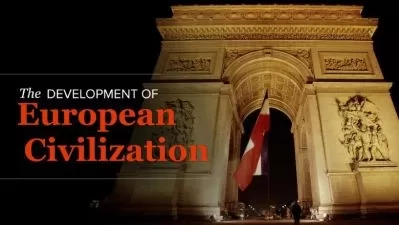Alexander the Great and the Hellenistic Age
Jeremy McInerney
12:04:49
Description
This series of lectures examines a crucial period in the history of the ancient world, the age ushered in by the extraordinary conquests of Alexander the Great. In all the annals of the ancient world, few stories are more gripping than that of the Hellenistic Age. Between the conquests of Alexander the Great and the rise of Rome, Greek culture became the heart of a world-historical civilization whose intellectual, spiritual, and artistic influence endures to this day.
Caesar's Shame
Julius Caesar lamented when he was in his early 30s that by his age Alexander had conquered the world, "and I have done nothing."
In just 10 years, this young prince from the small, hill kingdom of Macedon subdued the largest tract of the earth's surface ever conquered by one individual. His vast empire—encompassing all or part of 23 present-day countries—stretched from Mount Olympus and the Sahara Desert to the frontiers of India and Central Asia.
In the opening lectures, we explore the enigma of Alexander, son of a brilliant father, yet always at odds with the man whom he succeeded. We trace his early campaigns against the Persians and follow him to Egypt, where he was acclaimed as the son of god.
We look at his career after this and find in him a blend of greatness and madness as he strove to replace the Persian empire of the Achaemenid dynasty with a new, mixed ruling class of Macedonians and Persians.
Alexander's death in 323 BC ushered in a period of catastrophic change as ambitious warlords carved up Alexander's realm into their own separate empires. It is said that as the 33-year-old Alexander lay dying in Babylon in 323 B.C., he was asked who would inherit his empire. "The strongest," he answered.
Their struggle created three kingdoms, ruled by a small group of Macedonian nobles, that spanned from the eastern Mediterranean to the Hindu Kush:
- Ptolemaic Egypt (323-31 B.C.), whose last ruler was Cleopatra
- Seleucid Syria (323-64 B.C.), whose attack on the Temple in Jerusalem in 166 B.C. led to the Maccabean revolt
- The Attalid Empire in Asia Minor (281-133 B.C.), which, while smaller than the other two, produced a cultural flourishing in its capital Pergamum that rivaled Alexandria in Egypt.
The Middle East. In the Seleucid empire, the rulers also built Greek cities, such as Antioch, but in older regions, including Mesopotamia, they too were ready to be worshipped as living gods. On the edges of the Hellenistic world, in places as far away as Afghanistan and Pakistan, Greek cities grew up around trading posts and military settlements. Here, philosophy and literature from old Greece went hand in hand with gymnasiums and theaters to plant Greek culture far from the Mediterranean. By military and cultural conquest, then, much of central Asia was incorporated into the Greek world.
Despite the geographic extent of this civilization, we see that the heartland remained the eastern Mediterranean. It was here, in such new cities as Alexandria and Pergamum and such old ones as Athens, that Greek culture developed its distinctive Hellenistic appearance.
Hellenistic Culture
Philosophy. Philosophy became more academic, as different schools of philosophy emerged. Stoicism, epicureanism, and skepticism all looked for ways to teach people to avoid the emotional upheavals of life in an age of anxiety.
Art and Architecture. At the same time, art rejoiced in exploring the very same turmoil of the age. Hellenistic sculptors looked at the old, the young, the ugly, and the tortured instead of merely fashioning images of the perfect athlete. Differing sharply from the Classical art that precedes it, Hellenistic art is gargantuan, often "excessive," and nakedly emotional. It explores aspects of human experience previously outside the concerns of the Greeks.
Literature. Novelists also played with themes of the reversal of fortune in the lives of their characters, because such tumult was part of the experiences of so many people. Piracy, brigandage, physical hardship, and the supreme power of great kings were all realities of the age and left their marks on ordinary people.
Religion and Magic. As we see, these conditions helped spawn a vital interest in magic, spells, and incantations and in religions that offered people the promise of redemption and salvation. The cults of Isis, Serapis, and Cybele all grew in popularity throughout the Hellenistic world. This was the climate of the world in which Christianity was born.
Captured Greece? Captured Rome?
Although the Hellenistic Age would result in some of the greatest accomplishments in Greek culture, especially in the poetry of Callimachus, Theocritus, and Apollonius, the political power of the age was overshadowed by the growth of Rome.
Hence, we conclude the lectures with a study of the growth of Roman power, its expansion into the eastern Mediterranean, and the inevitable clash of Greek and Roman civilizations. We see that Rome conquered, but Rome would be forever changed by the contact with Greek culture. In the words of the Roman poet Horace, "Captured Greece took captive her captor."
More details
User Reviews
Rating
Jeremy McInerney
Instructor's CoursesDr. Jeremy McInerney is Davidson Kennedy Associate Professor of Classical Studies at the University of Pennsylvania. Dr. McInerney earned his Ph.D. from the University of California, Berkeley. He was the Wheeler Fellow at the American School of Classical Studies at Athens and has excavated in Israel, at Corinth, and on Crete. He serves on the Managing Committee of the American School of Classical Studies in Athens, Greece. Professor McInerney's research interests include topography, epigraphy and historiography. He is the author of The Folds of Parnassos: Land and Ethnicity in Ancient Pholis, and has published articles in a variety of academic journals including Greek, Roman and Byzantine Studies, the American Journal of Archaeology, Hesperia, and California Studies in Classical Antiquity. In 1997, he was an invited participant at a colloquium on ethnicity in the ancient world, hosted by the Center for Hellenic Studies in Washington.

The Great Courses
View courses The Great Courses- language english
- Training sessions 25
- duration 12:04:49
- English subtitles has
- Release Date 2023/05/09















